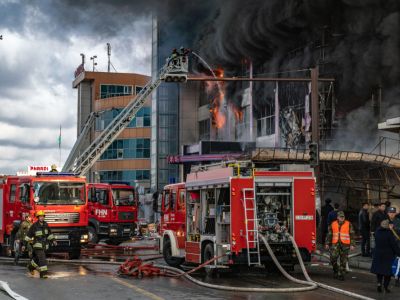The death of Afghan opposition commander Ahmad Shah Masood will spark unease in Washington and Moscow as the United States examines a possible military intervention to root out alleged terrorists in Afghanistan.
It will also have far-reaching consequences for the civil war and the future of the opposition alliance in Afghanistan, where the ruling Taliban militia is long suspected of providing a safe haven for militant Islamists.
Ousted president Burhanuddin Rabbani said Masood died Saturday after a suicide bombing which he blamed on Pakistan, the Taliban and alleged terrorist Osama bin Laden.
In the first official confirmation of the veteran commander's death, Rabbani described him as a "national hero" who had martyred himself for "jihad [holy war] and resistance".
A spokesman for Rabbani said Masood had died at 10:00 am (0530 GMT) in a hospital in northern Afghanistan, after losing his last battle against injuries sustained in a suicide bombing last Sunday.
Coming just two days before Tuesday's devastating terror attacks on the World Trade Center and the Pentagon, the bombing has inevitably sparked rumours of a trade-off between the ruling Taliban militia and their "guest" bin Laden.
The Taliban has already taken advantage of the former defence minister's absence from the scene and launched fresh attacks in the northeast and at the southern mouth of the Panjshir Valley, Masood's traditional stronghold.
It has also resisted fresh pressure to extradite bin Laden, who is reported to have gone into hiding in Afghanistan as Washington contemplates a possible military strike and rallies international support for a war on terrorism.
With Islamic insurgency on the rise in former Soviet Central Asia, Russia has been concerned that without Masood's last line of defence along the border with Tajikistan, the Taliban could soon be on its doorstep.
Along with Iran and India, Russia backed Masood's Northern Alliance, reportedly providing arms deliveries and logistical support.
Moscow, which regards Central Asia as its backyard, has also stationed border guards on Tajikistan's 1,500-kilometer frontier with Afghanistan.
Masood, a veteran commander who held Soviet forces at bay for 10 years during the 1979-89 occupation, was famous for leading battles from the frontlines and holding the fragile opposition alliance together with deft diplomacy.
His loss will be a major blow to the anti-Taliban resistance as the summer fighting season nears its traditionally bloody close.
The opposition has always been a motley alliance of former enemies and turncoats, including warlords from the Uzbek, Hazara and Masood's Tajik ethnic minorities.
But without Masood's leadership, and the contacts he enjoyed with allies in the international community, analysts said it could be in danger of crumbling.
Ex-communist general and Uzbek warlord Abdul Rashid Dostam -- at various times over the past decade both an enemy and an ally of Masood -- rejoined the alliance as recently as April after a period in exile following defeat at the hands of the Taliban.
He has launched a few minor attacks in his heartland of northern Balkh province since his return, but has failed to seriously trouble the Islamic militia, which seized Kabul in 1996.
In central Bamiyan province, the opposition alliance consists of Shiite Hazara forces led by the Hezb-e-Wahdat, a group which helped reduce much of Kabul to rubble when Masood was defense minister in the early 1990s.
Faced with the common threat of the Taliban, they have also buried their differences and sought safety in Masood's alliance, but have proved incapable of significant action outside the Hazarajat region around Bamiyan.
In the west, former governor of Herat province Islmail Khan also returned from exile in Iran earlier this year and has begun small-scale attacks against Taliban forces in the area.
His forces are believed to control swathes of countryside but the main roads and towns appear to be firmly in the Taliban's grip.
Most of the fighting this summer was in Masood's territory of Takhar province, where the Taliban launched a series of failed attacks aimed at the strategic Farkhar Valley.
Until this week, the opposition had held its lines, protecting Badakhshan, the last province under Masood's total control in the far northeast, as well as his traditional stronghold in the Panjshir valley nearer Kabul.
But Friday brought the first major test for Masood's replacement, former intelligence chief General Fahim, who was appointed Tuesday.
Taliban forces quickly captured Dashti-Rubat in Takhar and were close to Kalafgan district near Badakhshan after a heavy offensive, according to reports.
It was the hardline Islamic militia's first major territorial gains on the northern front in 12 months -- ISLAMABAD (AFP)
© 2001 Al Bawaba (www.albawaba.com)









